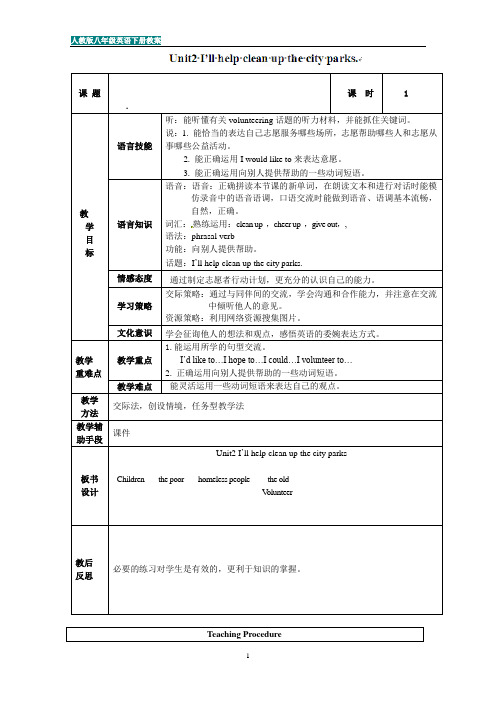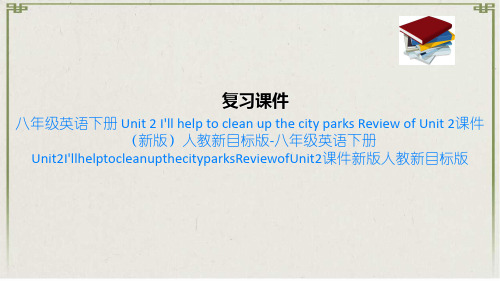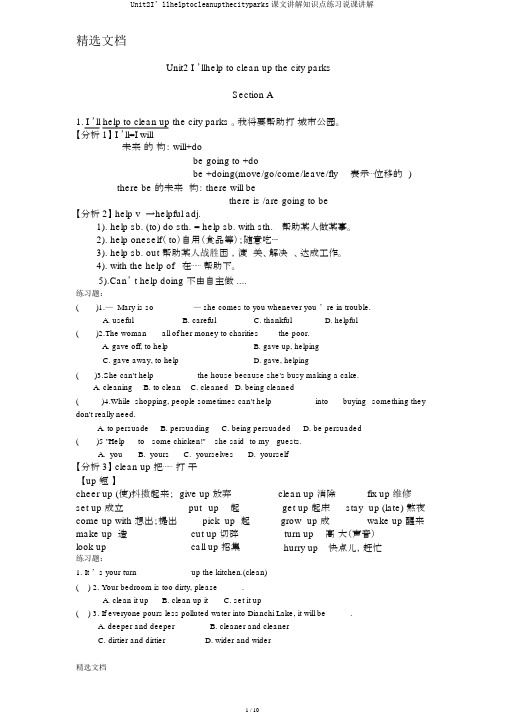Unit-2-I’ll-help-to-clean-up-the-city-parks.教案
八年级英语下册教案:Unit 2 I’ll help to clean up the city

课题.课时 1教学目标语言技能听:能听懂有关volunteering话题的听力材料,并能抓住关键词。
说:1. 能恰当的表达自己志愿服务哪些场所,志愿帮助哪些人和志愿从事哪些公益活动。
2. 能正确运用I would like to来表达意愿。
3. 能正确运用向别人提供帮助的一些动词短语。
语言知识语音:语音:正确拼读本节课的新单词,在朗读文本和进行对话时能模仿录音中的语音语调,口语交流时能做到语音、语调基本流畅,自然,正确。
词汇:熟练运用:clean up ,cheer up ,give out,,语法:phrasal verb功能:向别人提供帮助。
话题:I’ll help clean up the city parks.情感态度通过制定志愿者行动计划,更充分的认识自己的能力。
学习策略交际策略:通过与同伴间的交流,学会沟通和合作能力,并注意在交流中倾听他人的意见。
资源策略:利用网络资源搜集图片。
文化意识学会征询他人的想法和观点,感悟英语的委婉表达方式。
教学重难点教学重点1.能运用所学的句型交流。
I’d like to…I hope to…I could…I volunteer to…2. 正确运用向别人提供帮助的一些动词短语。
教学难点能灵活运用一些动词短语来表达自己的观点。
教学方法交际法,创设情境,任务型教学法教学辅助手段课件板书设计Unit2 I’ll help clean up the city parksChildren the poor homeless people the oldV olunteer教后反思必要的练习对学生是有效的,更利于知识的掌握。
Teaching ProcedureStages/TimingTeachet ers’ activities Students’ activities MethodologyStep 1 Warming upStep 2 lead-inStep 3 practice T: Could you please help me close thedoor?Could you please help me open thewindow?Thanks for your help.Do you know there is a special day inDecember. On that day, many peoplewo uld like to help others who need help.Do you know when is it and what day is itthat day?Introduction of “International V olunteerDay”Time: December 5th.They give people help without hope ofrewardLet’s enjoy some pictures.Show some pictures.They help to sent food to the poor people.They help to examine the health conditionof the old.They help to cut the hair of the poor.They help to clean the yards of thecommunity.They help to clean the bus-stop.What else could we do to help people?Show some other pictures.I’d like to/I hope to/I could/I volunteerto:help children with their schoolwork.visit the old in an old people’s home.help watch the traffic.give our old boo ks to “Hope School”.cheer up sick kids in the hospital.…1a. Look at the ways y ou could helppeople in thepicture. Then list other ways.Other ways you could help people___________________________________________________________________________________________________Ss do it.Ss think about it.Ss: They help to sentfood to the poorpeople.They help toexamine the healthcondition of the old.They help to cut thehair of the poor.They help to cleanthe yards of thecommunity.They help to cleanthe bus-stop.What else could wedo to help people?Ss: I’d like to/Ihope to/I could/Ivol unteer to:Ss do 1a.复习,进一步巩固落实。
人教新目标八年级英语下册Unit 2 I’ll help to clean up the city

Unit 2clean up 打扫(或清楚)干净【英国字母索源法】c(紧紧抓住)+lean倾斜(扫帚)→打扫,干净的lean[liːn]vi.倾斜;倚靠adj.瘦的;贫乏的vt.使倾斜n.瘦肉;倾斜[例]I’ll help to clean up the city parks.我将帮忙打扫市公园。
cheer /tʃɪə/ v. 欢呼; 喝彩【词汇倍增】看见beer他们cheercheer up (使)变得更高兴; 振奋起来[例]The girl could visit the sick kids in the hospital to cheer them up. 这个女孩会探访患病儿童给他们鼓劲儿。
give out 分发; 散发[例]The boy could give out food at the food bank.这个男孩会在食物银行发放食物。
volunteer /'vɒlən'tɪə/ v. 义务做; 自愿做n. 志愿者【英国字母索源法】vol,volunt= wish,will,表示“意志,意愿”volunteer n 志愿者(volunt+eer人→意愿的人→志愿者)voluntary a 志愿的,自愿的(volunt+ary)[例]The girl could volunteer in an after-school study program to teach kids. 这个女孩会在一个课外学习项目中担任自愿者来教孩子。
come up with 想出; 提出(主意、计划、回答等)[例]We need to come up with a plan for the City Park Clean-UP Day.我们需要就市公园清扫日的活动做出计划。
put off 推迟[例]We should put off the meeting.我们得推迟会议。
sign /saɪn/ n. 标志; 信号[例]We could see signs.我们能看见标志。
八年级英语下册 2 I'll help to clean up the city par

3. As a volunteer, the girl wants to visit sick kids in
the hospital _______ them up.
A. to cheer
B. cheer
C. cheering
D. cheered
短语动词
短语动词是由动词加介词、副词或 其他词构成的固定词组或习语,其作用 和动词相近。
9. I’m __e_x_c_it_e_d_ (excite) about your change. I’m happy you are a good student now.
三、单项选择。
1. The teenagers often help ______ water and
food to those people in need.
5. I’m able to have a “dog helper” because of your _k_i_n_d_n_e_s_s (kind).
6. Do you have any __d_i_ff_i_c_u_lt_ie_s__ (difficult) in learning English?
viewofUnit2课件新版人教新目标版
看看远处,要保护好眼睛哦~站起来
动一动,久坐对身体不好哦~
3. It took me _se_v_e_r_a_l (一些) days to finish the work. 4. To our __j_o_y__ (高兴), we arrived home before it
7. After six months of __tr_a_i_n_in_g__ (train), he is now good at playing basketball.
人教版八年级英语下册Unit 2 I'll help to clean up the cit

Unit2:I’ll help to clean up the city park.Section A:知识点一:clean up的用法:打扫干净如果宾语是名词:可放在之间或者末尾是代词:只能在之间。
例题:On Earth Day, many people in our city go to People’s Park to .A.Clean up itB.clean them upC.clean it upD.clean it up知识点二:cheer up使变得高兴;振奋起来如果宾语是名词:可放在之间或者末尾是代词:只能在之间。
例题:John isn’t happy today.Let’s go and .Good idea.A.cheer him upB.cheer up himC.to cheer up知识点三:give out散发,分发如果宾语是名词:可放在之间或者末尾是代词:只能在之间。
give的其他短语Give away 赠送give up 放弃give back 归还give off 发出放出Give sb sth给某人某物give in屈服例题:Could you please teach me how to red envelopes on WeChat? Sure. Let me show you.A.give outB.give backC.give way知识点四:put offput off意为“推迟”。
The concert was put off because of the heavy rain.演唱会因为大雨而被推迟了。
拓展:常见的put短语有:put off推迟;延迟穿上;put on展出;上演戴上put away收起来put out熄灭;扑灭put up with容忍put up搭建;建造张贴提升例4They the date of the meeting because of the bad weather.A.put offB.gave awayC.put onD.turn down知识点五used to的用法used to表示“过去常常;以前经常”,后跟动词原形,用来描述过去经常发生的动作或存在的状态。
八年级英语下册 Unit 2 I'll help to clean up the city par

2017春八年级英语下册Unit 2 I'll help to clean up the city parks(第5课时)练习(新版)人教新目标版编辑整理:尊敬的读者朋友们:这里是精品文档编辑中心,本文档内容是由我和我的同事精心编辑整理后发布的,发布之前我们对文中内容进行仔细校对,但是难免会有疏漏的地方,但是任然希望(2017春八年级英语下册Unit 2 I'll help to clean up the city parks(第5课时)练习(新版)人教新目标版)的内容能够给您的工作和学习带来便利。
同时也真诚的希望收到您的建议和反馈,这将是我们进步的源泉,前进的动力。
本文可编辑可修改,如果觉得对您有帮助请收藏以便随时查阅,最后祝您生活愉快业绩进步,以下为2017春八年级英语下册Unit 2 I'll help to clean up the city parks(第5课时)练习(新版)人教新目标版的全部内容。
Unit 2 I'll help to clean up the city parks第五课时Section B(2a~2e)Ⅰ.根据句意及汉语提示填写单词。
1.The poor old woman was blind(失明的).2.Jenny,can you open(打开) the door for me?3.How clever(聪明的) yo u are!You work it out!4.I read the story,but I didn’t understand(理解) it。
5.Your brother seemed different from before.He changed(改变) a lot.Ⅱ。
用括号内所给单词的适当形式填空。
6.We felt excited(excite) about the good news.7.Tom,take these letters(le tter) to Mr。
八年级英语下册 Unit 2 I’ll help to clean up the c

A: I'd like to work outside. B: You could help clean up the city parks.
A: I'd like to work outside. B: You could visit sick children in the hospital.
A group of students are planning a City Park Clean-Up
after-school study program to teach kids.
____1___ The boy could help to clean up
the city parks.
1c
Practice the conversation in the picture above. Then make other conversations using the information in 1b.
UNIT 2 I'LL HELP TO CLEAN
UP THE CITY PARKS.
Section A 1a-2d
1. Master the words and phrases of this
period.
2. Learn to talk about the ways we can help
1. Think about the ways we can help others
h__o_m_e_.___________________________ 4. _H_e_l_p_y_o_u__n_g_k_i_d_s_t_o_l_e_a_r_n_E__n_g_li_s_h_. ___
1b
Listen and number the ways the boy and girl could help others.
Unit2--I'll-help-clean-up-the-city-parks.知识点总结

Unit2 I’ll help to clean up the city parksSection A1. You could help clean up the city parks.你可以帮助打扫城市公园。
【解析1】help v →helpful1). help sb. to do sth. 帮助某人做某事。
2). help oneself (to )自用(食物等)。
3). help sb. out 帮助某人克服困难,渡过难关、解决问题、完成工作。
【解析2】clean up打扫(v. + adv.)( ) Your bedroom is too dirty, please _____.A. clean it upB. clean up itC. set it up2. The girl could visit the sick kids in the hospital to cheer them up.女孩可以去医院看望生病的孩子们,让他们振作起来。
【解析1】sick /ill :(1) sick adj.“生病的”,既可放be (系动词)后作表语,也可放n.前作定语。
be sick of …“讨厌;厌恶……”sick person = patient“病人”(2) ill adj.“生病的”,只能放be (系动词)后作表语,①. You look very tired. You must be sick. (= ill)②.He had a sick mothe r. 他有一位生病的母亲①I think her (ill) is very serious. 我认为她的病是很严重。
( )② The ___ girl was sent to hospital by her mother yesterday.A. sickB. illC. goodD. well【解析2】in the hospital 与in hospital(1) in the hospital“在医院”(2)in hospital “在医院;住院”( ) 【湖南邵阳】—My grandfather was ill _____ last week.—I’m sorry to hear that.A. in a hospitalB. in the hospitalC. in hospitalD. in hospitals【解析3】cheer up 使振奋,使高兴的(v. +adv)( )①You could visit _____children in the hospital and _____them______.A. ill, set, upB. sick, clean, upC. sick, cheer, up( )②He looks sad .Let’s ___ him___.A. cheer , upB. put, upC. set upD. call, up3. The boy could give out food at the food bank. 男孩可以在食物站分发食物【解析】give out =hand out分发(v. +adv) give out sth to sb. 分….给某人【短语】:give in 屈服give back=return 归还give a speech 发表give sb. a call 给……打电话give away 赠送give away money to kidsgive sb. a hand =help sb. 帮助某人give up doing sth =stop doing sth放弃做某事give sb. sth = give sth to sb. 给某人某物( )①You shouldn’t _____your hope. Everything will better.A. give upB. fix upC. cheer upD. put up4. We need to come up with a plan for the City Park Clean -up Day.我们需要为城市公园清洁日想出一个计划。
《Unit 2 I'll help to clean up the city parks. Sect

《I'll help to clean up the city parks. Section A 3a-3c》作业设计方案(第一课时)一、作业目标本节课的作业旨在帮助学生进一步理解和掌握与城市公园清洁相关的英语知识,提高他们的语言运用能力和团队协作能力,同时培养他们的环保意识和责任感。
二、作业内容1. 阅读理解:学生需完成一份与本节课内容相关的阅读理解练习,包括选择题、简答题等,旨在考察他们对课文的理解程度和提取关键信息的能力。
2. 写作练习:学生需根据课文中的对话或短文,撰写一篇关于城市公园清洁的作文,要求表达自己的观点和想法,字数不少于500字。
3. 小组讨论:学生需以小组为单位,围绕“如何帮助城市公园清洁”这一主题展开讨论,要求每位同学都积极参与并发表自己的看法,最后形成一份小组报告。
三、作业要求1. 作业完成后,需在规定时间内提交阅读理解和作文作业,以方便教师进行批改和评价。
2. 小组讨论报告需以PPT或Word文档的形式提交,要求内容清晰、逻辑性强、表达准确。
3. 作业内容需与本节课主题相关,不得偏离主题。
4. 作文和小组讨论中,要注重语言表达的准确性和流畅性,避免语法和拼写错误。
四、作业评价1. 阅读理解作业:教师将对答案进行批改,考察学生对课文的理解程度。
2. 作文作业:教师将根据作文的内容、语言表达和结构等方面进行评价,给予相应的分数。
3. 小组讨论报告:教师将根据报告的逻辑性、创新性、团队协作和表达准确性等方面进行评价,给出相应的分数和建议。
4. 整体评价:根据以上三项作业的完成情况,对学生本次课程的整体表现进行评价,包括对英语知识的掌握程度、语言运用能力、团队协作能力和环保意识等方面。
同时,教师将根据作业反馈,给予学生针对性的指导和建议,帮助他们更好地完成今后的学习任务。
最后,我们应强调的是,作业反馈和评价并非最终目的,而是为了更好地促进学生的学习和成长。
我们希望通过这样的作业设计,能够激发学生对环保问题的关注和思考,培养他们的社会责任感和环保意识,这才是我们进行此类教育活动所期望达到的最终目标。
Unit2I’llhelptocleanupthecityparks课文讲解知识点练习说课讲解

精选文档Unit2 I ’llhelp to clean up the city parksSection A1.I ’ll help to clean up the city parks 。
我将要帮助打城市公园。
【分析 1】 I ’ll=I will未来的构: will+dobe going to +dobe +doing(move/go/come/leave/fly表示⋯位移的) there be 的未来构: there will bethere is /are going to be【分析 2】 help v →helpful adj.1). help sb. (to) do sth. = help sb. with sth.帮助某人做某事。
2). help oneself( to)自用(食品等);随意吃···3). help sb. out 帮助某人战胜困,渡关、解决、达成工作。
4). with the help of在⋯⋯帮助下。
5).Can’ t help doing 不由自主做 ....练习题:()1.— Mary is so ________ — she comes to you whenever you ’re in trouble.A. usefulB. carefulC. thankfulD. helpful()2.The woman ___all of her money to charities____ the poor.A. gave off, to helpB. gave up, helpingC. gave away, to helpD. gave, helping()3.She can't help _________ the house because she's busy making a cake.A. cleaningB. to cleanC. cleanedD. being cleaned()4.While shopping, people sometimes can't help _________ into buying something they don't really need.A. to persuadeB. persuadingC. being persuadedD. be persuaded()5 "Help___to some chicken!"she said to my guests.A. youB. yoursC. yourselvesD. yourself【分析 3】 clean up 把⋯⋯打干【up 短】cheer up (使)抖擞起来; give up 放弃clean up 消除fix up 维修set up 成立put up 起get up 起床stay up (late) 熬夜come up with 想出;提出pick up 起grow up 成wake up 醒来make up 造cut up 切碎turn up高大(声音)look up call up 招集hurry up快点儿,赶忙练习题:1. It ’s your turn ____________up the kitchen.(clean)() 2. Your bedroom is too dirty, please _____.A. clean it upB. clean up itC. set it up() 3. If everyone pours less polluted water into Dianchi Lake, it will be _____.A. deeper and deeperB. cleaner and cleanerC. dirtier and dirtierD. wider and wider( )4 . —Diaoyu Island belongs to China.— Surely it does! We Chinese will never it up.A. cutB. fixC. giveD. set() 5. He looks sad .Let ’s ___ him___.A. cheer , upB. put, upC. set upD. call, up( ) 6. — It's too hard for me to be a trailwalker. — Never ________. Believe in yourself!A. put upB. give upC. hurry upD. look up2. The girl could visit the sick kids in the hospital to cheer them up. 女孩能够去医院探望患病的孩子们,让他们抖擞起来。
八年级英语下册-Unit-2-I'll-help-to-clean-up-the-city-park

第5页
13.(泸州中考)It's a good habit for us that we should never ___A____ today's work till tomorrow.
第3页
二、用方框中所给短语适当形式填空。 come up with,put off,used to,call up,care for
6.I have to go to Shanghai for a meeting.Can you help me __c_a_r_e_f_o_r_ my dog? 7.—Tom won first prize in the writing competition. —Really? I'll __c_a_l_l _ him ___u__p___ to tell the good news. 8.At last, Mandy ___c_a_m__e_u_p_w__it_h___ a good idea to solve that problem. 9.We have to ____p_u_t_o_f_f__ our trip because it's raining outside. 10.I ____u_s_e_d_t_o___ go to work by bus,but now I'm used to riding my bike.
第13页
第12页
A.I'm going to help out at Red Star Animal Hospital. B.When shall we meet? C.What did you do there? D.What are you doing? E.Who are you going with? F.I fed the cow. G.Would you like to go there again with me?
I'll-help-to-clean-up-the-city-parks教案

Unit 2 I’ll help to clean up the city park.Period 1 Section A (1a-2d)一、教学目标:1. 语言知识目标:1) 能掌握以下单词:clean up, city, cheer, cheer up, give out, volunteer, notice, used to, lonely,能掌握以下句型:① You could help to clean up the city parks.② We should listen to them and care for them.2) 能了解以下语法:情态动词could, should的用法;用should或could提出建议并对别人的建议作出评价。
如何表达主动提供帮助。
2. 情感态度价值观目标:在授课过程中渗透助人就是助己,助人收获快乐的情感目标,使学生在谈论如何为别人提供帮助的对话中能意识到尽己所能,帮助他人,乐于奉献是一种良好的品德,培养学生为他人着想,热爱公益事业,乐于助人的优良品质。
二、教学重难点1. 教学重点:1) 掌握这些短语动词的构成和用法:clean up, city, cheer, cheer up, give out,volunteer, notice, used to, lonely2) 学会提供帮助的基本句型:I’d like to work outside.I’ll help clean the city park.You could give out food at a food bank.2. 教学难点:学会提供帮助的基本句型三、教学过程Step 1 Warming up1. 播放学生志愿者进行义务帮助别人的活动视频,通过询问他们以下问题来引导学生们了解社会上一些的志愿们进行的活动。
T: Who are they?S:They’re volunteers. They usually volunteer to help others.T: How could we help people?S1: We could clean up the parksS2: We could help sick people in the hospital.S3: We could help plant trees.…Step 2 New words1. city n. 城市e.g. The library is in the north of the city. 图书馆在城市的北部。
- 1、下载文档前请自行甄别文档内容的完整性,平台不提供额外的编辑、内容补充、找答案等附加服务。
- 2、"仅部分预览"的文档,不可在线预览部分如存在完整性等问题,可反馈申请退款(可完整预览的文档不适用该条件!)。
- 3、如文档侵犯您的权益,请联系客服反馈,我们会尽快为您处理(人工客服工作时间:9:00-18:30)。
Unit 2 I’ll help to clean up the city parks.一、单元教学目标:1、知识能力目标:(1)了解英语词性概念及分类(Noun, Pronouns, Verbs, Adjectives, Adverb, Preposition, Conjunction, Exclamation),能熟练辨别英语单词的词性。
(2)懂得动词短语(phrasal verbs)的定义、分类和使用,熟记本单元出现的动词短语如:cheer up, clean up, call up, give out, hand out, give away, come up with, take after, fix up, set up, etc.(3)初步了解动词不定式的用法(4) 能够用本单元学到的单词与短语描述帮助人的经历。
2、情感目标:(1)通过对雷锋精神、感动中国人物事迹以及老师和学生的助人为乐的经历的讲解,让学生树立助人为乐的精神,提高社会责任认知感。
(2)创新上课模式,将英语知识融入到游戏中、竞争中,提高学生对英语的兴趣和思维创新以及学习创新。
二、教学方法:直观教学法、游戏法、竞争法,讲授法三、教学用具:多媒体、卡纸四、教学重点和难点:英语词性与动词词组五、教学程序Period 1Step 1 Greeting and warm-upGood morning, boys and girls. How is everything going with you? Did you have a good time last week? I hope you can enjoy yourself every day, every minute and every second.Step 2 Revision and lead inIf someone fell down in front of you, what should you do? If you fell down, do you hope other people can help you? Yes, to help or not to help. That is a question.Have you ever helped someone or been a volunteer before? Please put up your hand. Then the teacher asks one or two students who have put up hand to answer the question. The student can describ his/her experience from the aspect of who, when, where, how to help others.Step 3 Presentation1、通过学雷锋日奠定这单元的学习基调与背景Do you know what day March 5 is. Bingo, it is Learn from Lei-feng Day.Lei Feng helped lots of people in his life, so we should learn from him. Actually, I usually volunteer in some social activities. Let’s enjoy some photos. This photo was taken on World Earth Day in 2013. All the volunteers were cleaning up the street and picking up trash in the Dongting Lake. This photo was taken last year. Do you know where I was? Yes, I was with some disabled children in Yueyang children's welfare home. In order to cheer them up, we usually sing a song, dance or told stories for them. The third picture was taken in Yingshan community, the place where I am living now. What were we doing? We were selling vegetables and recycling things. We put up signs around our community and gave out all the money to the people who needs help.2、将本单元重要的动词词组串烧成一个助人为乐的故事Now I want to tell you a story about helping a homeless child in Chinese. Please listen carefully, When I finished, one of you should retell the story for us with the same gesture used by me. 一天我正在打扫房间,突然透过窗户看见有人在门外公告牌上贴了一张广告,于是上前细看。
说是一个生病残疾但很聪明的小孩需要帮助。
真的很想帮助他解决问题,摸了摸口袋,但是发现没有一分钱。
该怎么办呢?要不跟好朋友商量下!于是骑上自行车飞奔而去,但是中途单车坏了。
本来想放弃,或者是推迟计划。
但是想到那个孩子,我把车修好了继续向前走。
在路上刚好看到好朋友在闲逛,旁边还有跟他长得很像的弟弟。
我把事情跟他们说了,接着大家一起想出了一个计划。
发动更多的人,好朋友打电话给他爸妈,要他们复印了一些救助信息。
最后我们这些志愿者一起建立了一个团队。
一天下来,我们筹集了1000元,最后去了他住的医院照顾他给他加油打气,在临走时1000元捐赠给了他。
(The teacher should tell this story with body language and expressions. Especially in the place where some phrasal verbs used) Who can retell the story in Chinese to us with gestures? Actually, if you can remember the story, you have remembered many important phrasal verbs in this unit. Each gesture or movement stands for a phrasal verb. Let find them out and say it out with gestures.( From the story, students can not only get familiar with those phrasal verbs, but also can learn another way to remember English words, phrasals and sentences.) The teacher writes down the phrasal verbs on the write board. And finally the teacher shows gestures, the students say out corresponding phrasal verbs.3、通过多媒体PPT讲解动词词组的分类和构成4、Dictation of Unit 15、听班歌Can you sing an English song together for me? Except ABC song. I have chosen a song as our class song. The name is Yesterday once more. Let’s enjoy it now, each of you must learn it and can sing it in front of the whole class at the end of this term. Please ask your parents to download it from the computer for you. Those are lyrics.Period 2Step 1 Greeting and warm-upOk What do you think about this song? It is beautiful, nice, fantastic and wonderful, isn’t it?Step 2 Revision and lead inWords have magic, do you think so? A song, a story, an article and even a sentence are all formed on the basic of the words. There is no doubt that if you can finger it out the relationship between a word and another, it will be a piece of cake for you to make sentences or communicate with others in English. Do you know the parts of speech of English.Step 3 Presentation1、讲解英语词性的分类Actually, one language has some kind of connectionwith another. Take Chinese and English for example. 汉语有12中词类,实词:名词、动词、形容词、数词、量词和代词。
虚词:副词、介词、连词、助词、拟声词和叹词。
It is the same with English. English has n.-----noun:名词pron.----pronoun:代词v.----verb:动词conj.-----conjunction:连词adv.----adverb:副词adj.------adjective:形容词art.-----article:冠词prep.-----preposition:介词aux.-----auxiliary:助词vi.------verb intransitive:不及物动词vt.------verb transitive:及物动词num.-------number:数词int.----interjection:感叹词. 每种词性之间是有搭配关系和要求的. Please read after me.2、通过游戏进一步加深学生对英语词性的理解与分类Before we get to know their meanings and relationships, let’s play a game instead. I believe you have heard about the game of radish down. One student stands for one part of speech. Game starts like this “名词蹲名词蹲,名词蹲完形容词蹲”. Let's find out who will be the winner.3、通过PPT讲解,让学生了解每种词性之间的关系以及在句子中的作用。
